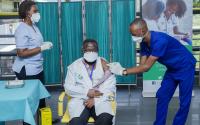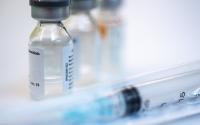[ad_1]
Table of Contents
Study shows strong 1-dose immune response with Pfizer vaccine
A single dose of the Pfizer-BioNTech COVID-19 vaccine was immunogenic in 92% of recipients, with no difference in immunogenic response between men and women but a decreasing response among older recipients, researchers from Israel’s Bar-Ilan University reported yesterday in Eurosurveillance.
The research also showed that, among those with previous evidence of infection with SARS-CoV-2, the virus that causes COVID-19, the immune response to a single dose was significantly stronger.
In the study, 514 Israeli healthcare workers received the vaccine and had their antibody levels measured before vaccination and 21 days after the first dose. Of the recipients, 475 (92.4%) had detectable anti-SARS-CoV-2 spike immunoglobulin G (IgG) antibodies at 21 days. Among the responders, there was no statistically significant difference in antibody titers between men and women, but titers decreased with increasing age. The 39 healthcare workers who did not have a robust immune response to the first dose were older (median age 57 versus 47 in responders).
Compared with recipients who had not previously been infected, the 17 recipients with evidence of prior COVID-19 infection had post-vaccination IgG levels that were much higher (geometric mean concentration, 573 vs 61.5), regardless of whether IgG antibodies were detectable before being vaccinated.
“The boost-like response seen among previously infected individuals in our cohort suggests B-cell-mediated memory immunity is preserved regardless of IgG status,” the authors wrote. “A single dose of vaccine in these individuals seems to boost the response although the optimal timing between infection and vaccination as well as the ensuing duration of protection remain to be determined.”
In a Bar-Ilan University press release, the study’s lead author suggested the findings could help countries make informed decisions on vaccine policy. “For instance, whether those previously infected should be vaccinated in priority and, if so, with how many doses,” said Michael Edelstein, MBChB, MSc, an associate professor at Bar-Ilan University.
But Edelstein and his co-authors said the findings need be replicated on a larger scale in order to make such decisions.
Feb 11 Eurosurveill rapid communication
Feb 11 Bar-Ilan University press release
Early anticoagulant use tied to fewer deaths in VA patients with COVID-19
COVID-19 patients given preventive anticoagulants, or blood thinners, within 24 hours of hospitalization may have a greater chance of survival than those who don’t receive them, suggests a large observational US Department of Veterans Affairs (VA) study published yesterday in BMJ.
A team led by researchers from the London School of Hygiene & Tropical Medicine mined the electronic health records of 4,297 VA patients hospitalized with COVID-19 from Mar 1 to Jul 31, 2020.
Of the 3,627 (84.4%) who received prophylactic anticoagulants (subcutaneous heparin or enoxaparin) on their first day in the hospital, 14.3% died within 30 days, compared with 18.7% of those who didn’t receive the drugs (relative risk reduction [RR], 34%; absolute RR, 4.4%).
Patients who received anticoagulants had a 27% lower risk of death within 30 days than those who didn’t receive them (hazard ratio [HR], 0.73). Similar associations were identified for inpatient death.
The anticoagulant benefit appeared to be greatest among patients not requiring intensive care unit admission within 24 hours of hospitalization. Anticoagulant use was not linked to an increased risk of serious bleeding requiring transfusion (HR, 0.87). Of the 4,297 patients, 93% were men; average age was 68 years.
Because coronavirus-related blood clots that develop in major arteries and veins can lead to death, the researchers aimed to see if anticoagulants, which have antiviral, and possibly anti-inflammatory, effects, could prevent coagulation. They noted that while previous studies had found evidence of the effectiveness of anticoagulants in coronavirus patients, they had small sample sizes or were conducted in relatively small healthcare systems.
“These findings provide strong real world evidence to support guidelines recommending the use of prophylactic anticoagulation as initial treatment for patients with COVID-19 on hospital admission,” the authors wrote.
Clinical trials are being conducted to determine whether anticoagulants could be an effective treatment for coronavirus.
Feb 11 BMJ study
Hypoxemia, age, inflammation found in children with severe COVID-19
Hypoxemia (oxygen saturation below 95%), older age, and inflammation measured by C-reactive protein (CRP) levels were indications of severe COVID-19 infections in 397 French children hospitalized with the disease, according to a study published today in Pediatrics.
The study, which spanned patients hospitalized from Feb 15 to Jun 1, 2020, covered 35.8% of the country’s pediatric COVID-19 cases.
Not including the children with multisystem inflammatory syndrome associated with COVID-19 (MIS-C) or those hospitalized for reasons other than COVID-19, 23 (7.5%) had severe infection, including 6 deaths. Severe cases were more common in children who were 10 or older (odds ratio [OR], 3.4; 95% confidence interval [CI], 1.1 to 10.3), hypoxemic (OR, 8.9; 95% CI, 2.6 to 29.7), or had a CRP of at least 80 milligrams per liter (OR, 6.6; 95% CI, 1.4 to 27.5).
MIS-C affected 29 (7.3%) of the cohort, of which 15 (51.7%) had severe cases. The researchers said their results support the idea that MIS-C occurs as a post-infectious event.
Overall, 20 of the children with severe cases needed invasive or noninvasive ventilator support, and 5 needed hemodynamic support.
While most hospital admissions were for children under 90 days old (36.5%), the researchers discovered that in this group, 58.6% had few symptoms, 40% were treated with antibiotics, and 68% were discharged with little care. In short, they write, most of these infants were most likely admitted because of an unknown fever and its risk of bacterial infection. Only four of the infants (2.8%) had severe infection.
The researchers included a seventh death in the study involving a child who had COVID antibodies but a negative reverse transcription polymerase chain reaction test, and these deaths made up all COVID pediatric deaths in the country during the study period. The average age was 9 years but ranged from 5 months to 17 years.
The authors conclude, “In contrast with preliminary reports, young age was not an independent factor associated with severe SARS-CoV-2 infection, and children <90 days old were at the lowest risk of severe disease evolution.”
Feb 12 Pediatrics study
[ad_2]
Source link












